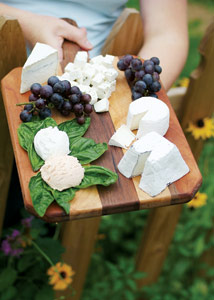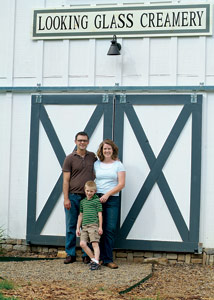In spring, everything tastes fresher — even the flavors of farmstead cheeses. To the attuned tongue, cheese made from the milk of pasture-grazed animals has a milder flavor with subtle grassy notes earlier in the season. While some local farm crops may just be sprouting, milk production is plentiful now. That's why Get Local, Appalachian Sustainable Agriculture Project's (ASAP) project that brings farmers and restaurants together each month to celebrate a local food, is featuring farmstead cheese in April.

Our area is home to numerous cheese-makers, many of whom make fresh goat cheese. There is variety among these soft, spreadable goat cheeses, available with seasonings ranging from bee pollen to ramps. Nevertheless, it's exciting to see a whole other category of cheese appearing on the local market. More complex varieties of aged cheeses, made from various types of milks, are now being crafted by a number of local artisans, including Jennifer Perkins of Looking Glass Creamery in Fairview.
Perkins makes chevre, feta and mozzarella, but she's also especially proud of her hard-aged cow-milk cheese, as well as her Ellington and Early Bird aged bloomy-rind cheeses. Bloomy-rind means the cheeses are carefully ripened to develop a coating of mold and a semi-soft interior. Perkins has spent years crafting these recipes.
Perkins' attention to detail extends to the appearance and presentation of her products. "They're very pretty little cheeses," she says of the rounds and pyramids she makes. Their striking visual characteristics include layers of ash, velvety coatings, ridged rinds, red highlights, brine washes and even a cocoa rub on a new cheese she's perfecting.
She explains that aged cheeses require very specific conditions and careful management to develop properly. Temperatures must be carefully monitored and the cheeses must be hand-turned every day. "The artisan element really comes into play with aged cheeses," Perkins observes. "Each cheese is unique to the maker, and created by an individual attending to every detail; I baby my cheese from beginning to end." Perkins adds that she hopes to see the local community of cheese-makers continue to grow and diversify, until Western North Carolina is known as a center for artisan cheese, like the Vermont Cheese Trail.
Looking Glass Creamery products can be found at tailgate farmers markets and many grocers. For more information, visit www.ashevillecheese.com.You can find many other local cheese makers at www.buyappalachian.org.
Sampling the flavors of spring
In addition to cheese, April farmers markets also boasts the freshest of spring's produce. "After such a dreary winter, I can't wait for fresh produce and farmers markets' simple pleasures, such as eating a strawberry in the sunshine," say Asheville resident Brook Thompson. This month, local farmers are filling up their tents and tables with classic spring favorites like strawberries, asparagus, peas, and artichokes.

Greens are perhaps the most bountiful crop in spring. Tailgate market shoppers can choose from a huge variety including arugula, Chinese greens, collards, kale, lettuce, mustard greens, spinach, watercress and chard. Root crops are coming in, too, beginning with radishes and turnips.
To accompany vegetables, shop farmers markets for mushrooms, eggs, chicken, beef, lamb, pork, rainbow trout and cheese. Farmstead cheeses, local honey and jams make perfect additions to locally baked breads. Local bakers also supply sweet goods like scones, tarts, muffins and gluten-free goodies.
Even those who grow their own food have reason to shop at farmers markets — they're a great source for plant starts and nursery starts. Arts and crafts are available throughout the market season, and at many markets feature musicians who provide live entertainment while you shop.
There are multiple markets in Buncombe County and throughout the counties of Western North Carolina. Find the opening dates and details for the farmers market in your community at www.buyappalachian.org.
[Rose McLarney works for the Appalachian Sustainable Agriculture Project (www.asapconnections.org), a nonprofit organization that works to keep farmers farming and reconnect people with their food. Contact her at rose@asapconnections.org.]



Before you comment
The comments section is here to provide a platform for civil dialogue on the issues we face together as a local community. Xpress is committed to offering this platform for all voices, but when the tone of the discussion gets nasty or strays off topic, we believe many people choose not to participate. Xpress editors are determined to moderate comments to ensure a constructive interchange is maintained. All comments judged not to be in keeping with the spirit of civil discourse will be removed and repeat violators will be banned. See here for our terms of service. Thank you for being part of this effort to promote respectful discussion.